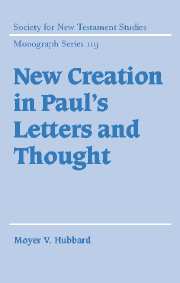Book contents
- Frontmatter
- Contents
- Acknowledgments
- List of abbreviations
- 1 Introduction: the current debate
- PART I NEW CREATION: CENTRAL JEWISH TEXTS
- Part II FROM DEATH TO LIFE: NEW CREATION IN THE CONTOURS OF PAUL'S THOUGHT
- 5 From death to life: insights from cultural anthropology
- 6 Newness of life: Romans 6.1–11
- 7 Newness of the Spirit: Romans 7.1–6
- 8 Spirit, newness, life: the Pauline antecedents
- 9 Crucified with Christ: Galatians 2.19–20
- Part III THE OLD AND THE NEW: NEW CREATION IN THE CONTEXT OF PAUL'S LETTERS
- References
- Index of passages cited
- Index of modern authors
8 - Spirit, newness, life: the Pauline antecedents
Published online by Cambridge University Press: 02 December 2009
- Frontmatter
- Contents
- Acknowledgments
- List of abbreviations
- 1 Introduction: the current debate
- PART I NEW CREATION: CENTRAL JEWISH TEXTS
- Part II FROM DEATH TO LIFE: NEW CREATION IN THE CONTOURS OF PAUL'S THOUGHT
- 5 From death to life: insights from cultural anthropology
- 6 Newness of life: Romans 6.1–11
- 7 Newness of the Spirit: Romans 7.1–6
- 8 Spirit, newness, life: the Pauline antecedents
- 9 Crucified with Christ: Galatians 2.19–20
- Part III THE OLD AND THE NEW: NEW CREATION IN THE CONTEXT OF PAUL'S LETTERS
- References
- Index of passages cited
- Index of modern authors
Summary
Because “spirit” is the most life-giving, and God is the author of life.
Philo, De Opificio MundiThe question of the correct starting-point for the examination of the Spirit in Paul's letters was posed several decades ago by Otto Kuss, and again recently by Gordon Fee. It is no small irony that Fee, a (neo-)Pentecostal, begins with eschatology, while Kuss, a Roman Catholic, begins with glossolalia. Few would now doubt the correctness of Fee's approach, without implying any criticism of Gunkel's emphasis on the dynamic and ecstatic element associated with the Spirit in the New Testament. Kuss was correct, however, to insist that the Old Testament was decisive for Paul in that it provided him with an eschatological framework and categories with which to interpret his experience of the Spirit, and at this point Kuss stands with the consensus. In sketching the Pauline antecedents, I will restrict myself to two prominent and easily discernible lines of tradition which were not only picked up and continued by Paul, but were intertwined by him as well: the Spirit as the sign of the eschaton, and the Spirit as the creator of life.
The Pauline antecedents
The Spirit and the eschaton
The association of the age to come with an outpouring of God's Spirit is a familiar theme in Israel's prophetic traditions, and did not go unnoticed by the early church as it sought to explain its own experience of the Spirit. Joel's prophecy of a universal outpouring was eagerly appropriated toward this end (Acts 2; cf. Rom. 10.13), and this is but one text in a rich archive of material which must have shaped the self-identity of primitive Christianity.
- Type
- Chapter
- Information
- New Creation in Paul's Letters and Thought , pp. 113 - 122Publisher: Cambridge University PressPrint publication year: 2002



